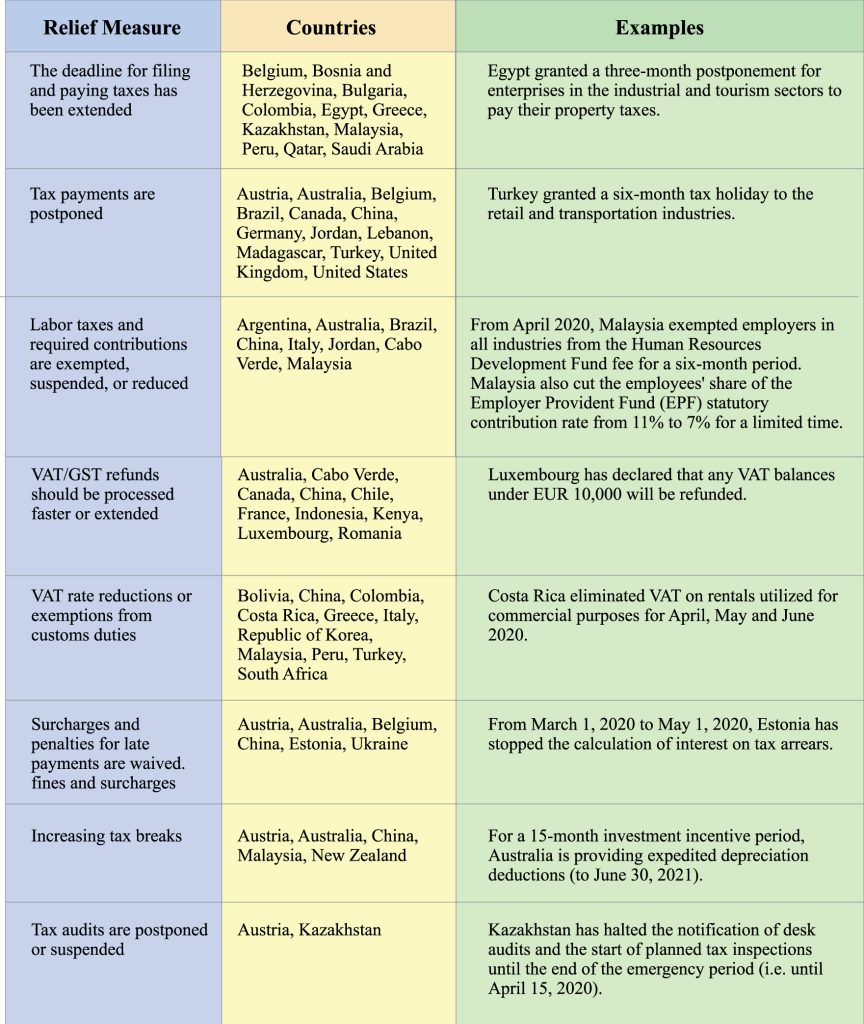Governments worldwide are providing tax relief to help people and businesses deal with their cash flow problems and prepare for the economic downturn caused by the coronavirus epidemic. According to the International Monetary Fund, PwC, Tax Foundation, and OECD crisis trackers, 105 nations have enacted tax assistance to mitigate the economic impact of the pandemic. It’s a great opportunity for the entrepreneurs who are struggling. Let’s know the initiatives that worldwide leaders take for entrepreneurs. The table shows tax measure around the world, reported by World Bank:

To inform more, The Canadian Government provided the fund to help Black Canadian entrepreneurs and business owners overcome some systemic challenges they experience and establish and expand their businesses, serving as the loan fund administrator. The fund has a total investment of about 291 million Canadian dollars.
According to research, Black Canadian entrepreneurs suffer significant systemic impediments to doing business and receiving funding, particularly during COVID-19. Additionally, while financial institutions tightened their lending and investment policies, the Business Development Bank of Canada (BDC) leaned in and tried to help its network of entrepreneurs weather the storm. Indeed, this is a once-in-a-lifetime opportunity to become a long-term part of Canada’s economic fabric.
What Bangladesh Did?
The Bangladesh government committed Tk 220.0 billion crores under the first stimulus package to address the vulnerabilities faced by SMEs; nevertheless, the rate of disbursement was delayed compared to subsequent stimulus packages. Approximately 68% of the designated fund had been released as of April 11, 2021. According to gender disaggregation, 94% of the beneficiaries of loans under this package were men, while only 6% were women. The allocation for female entrepreneurs, on the other hand, was more than the minimal objective amount (5.7 percent of the total allocation of funds against the target level of 5 percent). Aside from that, the Government has unveiled a new Tk.27.0 billion stimulus package to boost cottage industries and SMEs.
Also, tax reform has been implemented in an attempt to combat the low demand. In addition, a few fiscal incentives, such as corporate tax cuts, have been proposed to boost investment and lower operational expenses. As a result, employment would increase. The majority of these incentives are geared toward businesses, and they will assist cut operating costs by lowering taxes on capital and essential raw materials imports. Tax reductions will enable enterprises to maintain higher profits and re-invest in the Economy.
What’s more, the Bangladesh Bank has been implementing 6 of 23 financial packages. These (Bangladesh Bank packages) are worth Tk 900 billion, which form 70 percent of the entire package. The remaining 30 percent, worth Tk 384.41 billion, is implemented through budget allocation.
Moreover, the Bangladesh Investment Development Authority (BIDA) has begun offering a ‘One-Stop Service,’ intended to help investors get their money as swiftly as possible. In addition, in November 2020, the parliament authorized a modification to the company legislation to allow individuals to form a company by themselves, often known as a one-person company, to foster entrepreneurship.
Furthermore, the bitter truth is that more than 4,00,000 migrants returned to Bangladesh due to the ongoing pandemic. Hence, Standard Chartered Bangladesh and BRAC have announced the establishment of a COVID-19 response effort that would engage with returnee migrant workers to improve skills and businesses to ensure economic self-sufficiency. The two-year initiative “COVID-19 recovery: Entrepreneurship Training and Gainful Employment for Returning Migrants Affected by COVID-19 in Bangladesh” is being funded by the Standard Chartered Foundation.
Bangladesh has imposed a lockdown several times since the pandemic last year to curb rising cases and deaths. However, the restrictions have significantly impacted many businesses struggling to deal with the periodic closures and other barriers set up to handle the pandemic.

















